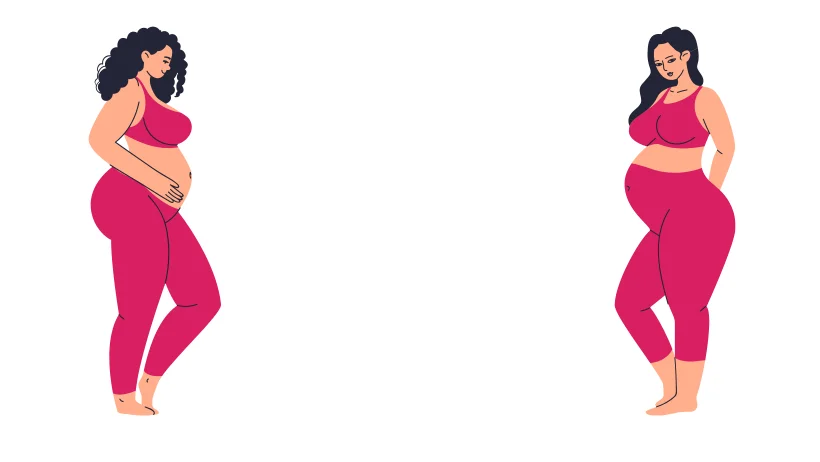
Plus size pregnancy: What to know about your health
Healthy plus-size pregnancies are possible!
An overweight pregnancy does raise your risk for a number of complications, but many can be avoided with proper care and monitoring.
What is considered a plus size pregnancy?
You’re considered overweight if your pre-pregnancy body mass index (BMI) is between 25 and 29.9, which can lead to health problems like diabetes or heart disease in future pregnancies
BMI is a rough estimate of body fat based on your height and weight. It doesn’t take genetics, race, or age into consideration.
Researchers have found that people with higher BMIs are at risk for more complications during pregnancy and labor pains accumulate over time due to their increase in size.
How important is your weight during pregnancy?
When you become pregnant, the weight that your body currently weighs will determine how it affects both yourself and future babies.
If a woman gains too little during her pregnancy then she risks having premature delivery or delivering low birth weight children who may be healthy but not sturdy enough to survive; while gaining more than what is recommended can result in other complications like high blood pressure among others.
A healthy weight when starting pregnancy is ideal, but keep in mind that most women who fall outside the recommended weights still have normal pregnancies and healthy babies. Many conditions linked with being overweight can be managed or prevented—some even before you know there’s a problem.
Health conditions associated with plus size pregnancies
Pregnancy is a beautiful time in your life, but it does come with some challenges. If you’re carrying extra weight going into pregnancy then there’s an increased risk for certain complications which can be avoided by understanding what factors may cause them or how to avoid these risks altogether.
Gestational diabetes
The most common condition affecting blood sugar levels during pregnancy is pre-diabetes. Your healthcare provider will evaluate your glucose screening and tolerance tests, which are usually done between 24 – 28 weeks of conception but may happen earlier if you’re overweight or have have other risk factors for this illness at a time point prior to fertilization.
Overweight and obese gestational diabetic women are at risk for having a more severe form of the illness that can lead to complications during childbirth, as well as motherhood itself if not treated properly with medication or delivery by C-section.
Uncontrolled gestational diabetes can lead to complications like hypoglycemia (low blood sugar), jaundice, and breathing problems in your baby after birth. It also increases risks for injury or shoulder dystocia – when the newborn becomes stuck behind mom’s pubic bone during delivery, which is a rare but serious situation where you might need emergency surgery.
Preeclampsia
Preeclampsia is a condition that can develop during pregnancy if you have high blood pressure along with at least one other symptom. These include protein problems in your urine, liver, or kidney abnormalities; persistent headaches, and vision changes – all of which will require medical attention immediately.
Gestational hypertension
Gestational hypertension is a condition that occurs during pregnancy and affects around 10% of obese women.
Women who develop high blood pressure during pregnancy may be diagnosed with gestational hypertension. This is a type of pre-eclampsia, and around 10% percent occur in obese women.
Obstructive sleep apnea
The heavier you are, to begin with, the more likely it is that sleep will be interrupted by periods of not breathing. This can result from being overweight or obese during pregnancy and gaining weight in general beyond what was expected based on your starting size before becoming pregnant.
Sleep apnea, prevents you from breathing during the REM cycle-the 30 minute period where your brain manufactures dreaming while asleep.
Longer Labor
There’s a good chance you’ll be in labor longer if your BMI is higher.
Labor complications
In a study involving over 250,000 women from all around the world, it was found that pre-pregnancy weight and gestation weight gain are associated with pregnancy complications. Mothers who have an obese husband or live in countries where there is less access to healthcare also face higher risks for these issues during their pregnancies. Being overweight or obese increases your risk of
- Cesarean delivery
- Preterm birth
- Pregnancy Loss & Stillbirth
Are there any risks for your baby during plus size pregnancy?
Here are some conditions and situations that might affect your baby if you’re plus sized and pregnant:
Large baby
Women who are plus-sized have an increased risk of macrosomia or having a baby that weighs at least 9 pounds. The cause is unknown, but there may be links between undiagnosed gestational diabetes and large offspring production due to genetic factors.
The average weight for all babies ranges from 5 – 8 lbs., though some will weigh more than others depending on how much mom bears within her body structure.
Macrosmatic babies are at increased risk for certain complications during birth. Ultrasounds may not always be accurate enough to determine the size of your baby, so it’s best if you wait until after they’re born and weighed.
How to stay healthy and lower the risk of complications if you’re going through plus size maternity
The best way to decrease the risks of complications caused by obesity is to lose weight before you become pregnant. Even a small reduction can result in improved outcomes for both mother and baby!
But if already pregnant, don’t worry – there’s still hope that your pregnancy will go smoothly with help from an experienced doctor who understands how complex these cases sometimes are. Being diligent about these things will help:
- Eat healthfully
- Stay hydrated
- Stay active
- Seek good prenatal care
If you’re at risk during pregnancy or have been diagnosed with gestational diabetes, we can help.
Book a consultation with The Best Maternity Specialists in Bangalore.
